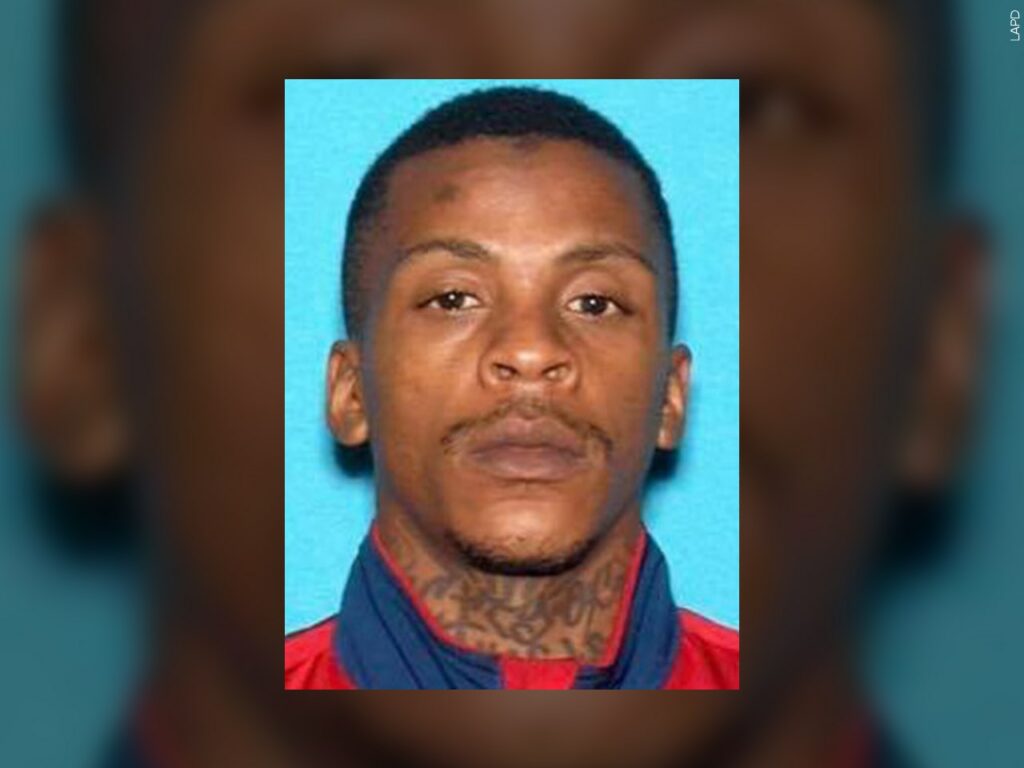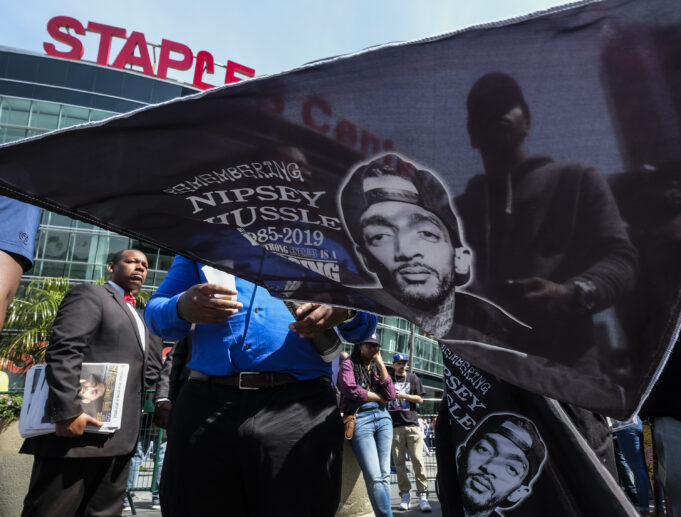by Naba’a Muhammad and Charlene Muhammad
LOS ANGELES—After three years of waiting for the outcome of the murder trial of the man who took the life of hip hop legend and entrepreneur Nipsey Hussle, the outcome doesn’t hinge on who fired the shots.
But rather the state of mind of Eric R. Holder Jr., the 33 year old man with blazing guns captured on videotape and seen by eyewitnesses.
He is charged with premeditated and deliberate murder, attempted murder, assault with a firearm, and possession of a firearm as a convicted felon.
He killed Ermias Asghedom, who millions know as Nipsey Hussle.
The killer’s defense lawyer admitted early in the trial, long before it went to jury, that fear drove him to pump at least 11 bullets into Nipsey and injure two others.
Nipsey called Mr. Holder Jr. a snitch and that was a dangerous label, said attorney Aaron Jansen, defending his client.
In an emotionally overwhelmed moment, Mr. Holder, Jr., used his guns, the defense lawyer said.

Los Angeles County Deputy District Attorney John McKinney countered that Mr. Holder Jr. and Nipsey had been members of the Rollin 60s street organization. The problem, the prosecutor argued, was the killer and failed rapper’s “preexisting envy and jealousy” when he fatally shot the Grammy-nominated and successful independent rapper. Jury deliberations began July 1.
Nipsey, an artist, businessman, and community builder, was gunned down by someone from his own neighborhood, his own gang, a person that he considered a friend and had just shaken hands with, prosecutor McKinney said.
His closing arguments started with a photograph of a smiling Nipsey, a favorite son of Los Angeles, who while wayward in his earlier years, changed his life over time.
Mr. McKinney replayed the shooting video, saying Mr. Holder, Jr., decided at Nipsey’s Marathon Clothing store plaza to kill the rapper and kill or chase away anyone in his way. Shermi Villanueva and Evan “Rimpau” McKenzie, who were talking with Nipsey, survived, the former grazed superficially on his stomach. He said his belt buckle stopped the bullet. However, his uncle Kerry Lathan wasn’t so lucky and was shot in the back.
“What are the chances that you shoot two people accidentally, when your victim goes down on the first shot?” asked prosecutor McKinney.
Ten minutes after the conversation, Mr. Holder was not consumed by rage, but he left to get food, park and eat, continued Mr. McKinney. “Even if you felt that Nipsey Hussle did something to provoke him, there is a cooling off period,” he stated.
That “cooling off period,” called premeditation by the prosecutor, goes to the harshest charges and likely life sentence if sustained. The defense lawyer, who argued the case was overcharged by prosecutors from the start, wants the lesser charges and less jail time.
Defense lawyer Jansen said his client didn’t know the two other men shot and should have only been charged with assault with a deadly weapon not attempted murder.
According to Mr. Jansen, Mr. Holder Jr. was pressured into gang life at an early age, but by 2016 had moved on and fathered a daughter. He worked in a restaurant, made music as a hobby, served time in county jail, but on March 31, 2019, he “had an innocent state of mind,” Mr. Jansen said. He wasn’t gangbanging, came to his old neighborhood for chili cheese fries, and had no animosity toward Nipsey, the public defender continued.
A reasonable person would conclude Nipsey was passing a rumor that Mr. Holder was snitching, brushing his client off and giving no details or legal documents that would clear his name, added the defense lawyer.
Mr. Jansen said, “We know that people are afraid of being labeled as a snitch.”
“Let’s talk about ‘Little Eric Holder,’ ” responded prosecutor McKinney. What you saw was a shirtless Eric Holder, flossing his Rollin 60s tattoos in their territory, he stated. “He showed up with not one but two loaded handguns. Does that sound like someone who’s left gang life behind?” Mr. McKinney said.
Mr. Holder Jr. had a gun in his pocket and if what Nipsey said was that bad, if he was so insulted and enraged, jurors would have seen a reaction in that moment, Mr. McKinney said.
If Mr. Holder Jr. was out of gang life, he wouldn›t care about being called a snitch in a neighborhood he hadn’t lived in or been to for quite some time, the prosecutor argued. “Little Eric Holder” killed the 33 year old hip-hop star, family man, entrepreneur and community builder but not over a conversation. Driven by envy, jealousy, he walked away, set up his escape by telling the woman driving him where to move the car, retrieving weapons and blasting three people, the prosecutor said.
“When he walked up to the group, he said, ‘You’re through,’ to Nipsey Hussle. ‘You’re through.’ He didn’t say, ‘I’m not a snitch,’ ” said Mr. McKinney.
The trial has been emotional, contentious, and was delayed, in part, because Mr. Holder Jr. was severely beaten by other inmates, and some witnesses’ reluctance to appear in court.
Deputy Public Defender Jansen told The Final Call in a phone interview that his client was jumped June 28 by two people in a county jail holding tank with some 13 others.
“He was resting and his head was down when he was socked in the face and cut with a razor or some sharp object in the back of his head,” Atty. Jansen said. “He has a black eye and three staples in his head. He was cut.”
Nipsey’s death was felt around the world, but especially in his hometown where a 2019 memorial service at the Staples Center brought out thousands—family, friends, fans, celebrities—and the Honorable Minister Louis Farrakhan was among speakers at the homegoing service.
Nipsey was posthumously given a Grammy for “best rap performance,” BET’s humanitarian award and a star on the Hollywood Walk of Fame among other honors. He was lauded for his vision for buying up the blocks where he once sold drugs and urging Blacks to own where they lived in the face of South Central gentrification and run their own businesses.
The trial, which opened June 15, started with eyewitness denials that Nipsey called his killer a snitch. “My homeboy never called that man a snitch. Never,” stated Herman Douglas, Nipsey’s longtime friend or “big homie” known as “Cowboy.” He was a member of the same Rollin 60s street gang as Nipsey and Mr. Holder Jr.
Just my testifying in court could be called snitching, Mr. Douglas explained, adding he doesn’t fear for his safety because he is doing the right thing and no longer considers himself a member of a gang.
“What’s right is right what’s wrong is wrong. That’s not snitching. It was a foul crime and I gotta do what I gotta do,” said the 49 year old.
Mr. Holder Jr. decided to hold court on the streets, he continued.
Mr. Douglas said he was only in court because Mr. Holder, Jr., “harmed” his Rollin 60s “family” and the video will convict the shooter. “Shooting Nipsey was worse than snitching. That’s a short death penalty,” he said.
“I just feel regret that I left his (Nipsey’s) side,” Mr. Douglas continued, tearing up, wiping his face, and slowly shaking his head from side to side. “No way, no how, would I have thought this dude would have come back and do that shit,” he said.
Mr. Douglas and three others testified Nipsey’s attitude was cool during the exchange. Mr. Holder was “received just like a normal homie; nothing was unusual,” said Mr. Douglas. Mr. Lathan described Nipsey as “in a good mood, friendly that day. … He was a friendly person. The word snitching never came up. It was more like he was looking out for him … Nipsey’s demeanor was not animated at all,” he said. The interaction was “more or less a father to a son,” added Mr. Douglas.
Daude Sherrills, a gang peace activist and executive director of the Build Plus Community Marketplace in Watts, had a special reason for coming to court. “He (Nipsey) was from the neighborhood, but he was doing something for the overall benefit of his people and his generation, and it was cut short,” Mr. Sherrills explained.
“He was doing something for his people, not his neighborhood, and we have to protect people like that.”
The activist was greatly impacted by the testimonies, particularly about the actual shooting and Mr. Douglas’s feelings of regret. “It’s just like having a son, and your son ends up murdered and you regret that you didn’t tell him to stay in the house that day,” said Mr. Sherrills.
“These bullets traumatized a whole community. Crimes like this, the enormity of these crimes, is that they can’t be contained,” said Mr. McKinney, the Los Angeles county prosecutor. “The bullets land either in a person or they hit a wall. They stop. But in a figurative sense these bullets are still traveling. This neighborhood has not forgotten.”
Rashida R. Muhammad edited this report.













